
News
Behind the Headlines
Two-Cents Worth
Video of the Week
News Blurbs
Articles
Testimony
Bible Questions
Internet Articles (2017)
Internet Articles (2016)
Internet Articles (2015)
Internet Articles (2014)
Internet
Articles (2013)
Internet Articles (2012)
Internet Articles (2011)
Internet Articles (2010)
Internet Articles
(2009)
Internet Articles (2008)
Internet Articles (2007)
Internet Articles (2006)
Internet Articles (2005)
Internet Articles (2004)
Internet Articles (2003)
Internet Articles (2002)
Internet Articles (2001)

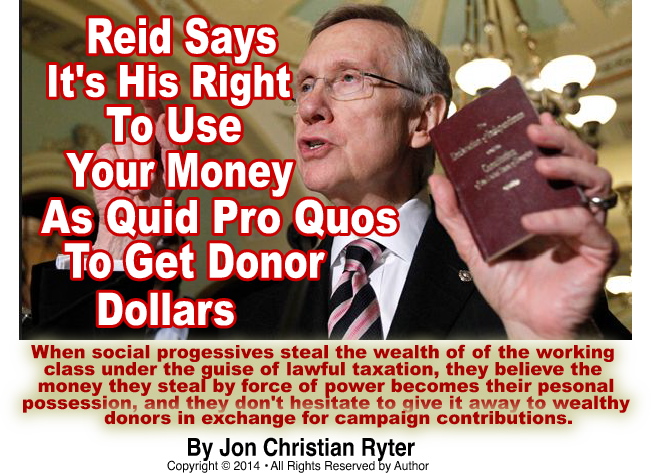
![]() n an impromptu press conference at 3:10 pm EST on Dec. 16, 2010 a few minutes before losing his war to ram an earmark-packed Omnibus Budget Bill through the US Senate, Majority Leader Harry Reid [D-NV] told the assembled news media that members of both Houses of Congress "... have a constitutional duty to approve earmarks." Holding Sen. Robert Byrd's [D-WV] well-worn leather-bound pocket copy of the US Constitution which Byrd bequeathed to Reid shortly before his death and, holding it up for the cameras to see, Reid said: "What little Constitution we have doesn't have a lot of information in it, but what is in it runs this country. And, I am convinced that I do not want to give up more power to the White House...Part of my constitutional duty is to do constitutionally-directed spending. I fight for it."
n an impromptu press conference at 3:10 pm EST on Dec. 16, 2010 a few minutes before losing his war to ram an earmark-packed Omnibus Budget Bill through the US Senate, Majority Leader Harry Reid [D-NV] told the assembled news media that members of both Houses of Congress "... have a constitutional duty to approve earmarks." Holding Sen. Robert Byrd's [D-WV] well-worn leather-bound pocket copy of the US Constitution which Byrd bequeathed to Reid shortly before his death and, holding it up for the cameras to see, Reid said: "What little Constitution we have doesn't have a lot of information in it, but what is in it runs this country. And, I am convinced that I do not want to give up more power to the White House...Part of my constitutional duty is to do constitutionally-directed spending. I fight for it."
Reid's 2010 impromptu statement was not just a passing remark. It's the core belief of every social progressive politician that's ever crawled out from under a rock and into bed with special interest lobbyists who swap special interest dollars for campaign donations which many times are funneled through political action groups owned by the politician or his or her family members. The quid pro quos translate into votes, and they contribute to the family wealth. That's how small town school teachers, local radio and TV talk show hosts and local prosecutors with one good, headline making conviction under their belts get elected and, thirty years later either die or retire as a millionaire.
It's time that the American people—particularly those who regularly vote—realize that campaign contributions are bribes. Because, excluding special limits, citizen voters have a maximum amount they can donate that is miniscule in the long run: $2,500.00 for an election primary and another $2,500.00 for the general election.. In addition, they can donate $5,000.00 to a National Political Party. They think that's the limit everyone has, and for that reason, they can't imagine any politician—even Harry Reid—selling his soul, or selling out his nation for $10,000 to $15,000.
In 2011 when the Republicans took control of the second half of the 1112th Congress in the House of Representatives, they killed all forms of earmarks—both soft and hard—since that was the form of bribery that both House Speaker Nancy Pelosi [D-CA] and Senate Majority Leader Harry Reid [D-NV] used to ram Obamacare through Congress. Since the House controls the purse strings of America, and since all spending must originate in the House, until the House vacates that rule, softmarks and hardmarks are effectively dead.
When the off-year newly-elected governor of Virginia, former Clinton bundler Terry McAuliffe raised $275 million for the Clinton Campaign plus an additional $26.3 million for Bill Clinton did you ask yourself what happened to the Federal donor level limitations" for wealthy who feed on government contracts? When McAuliffe became the head of the Democratic National Committee, he raised an additional $578 million for the DNC (which also included commission which made McAuliffe a millionaire during the Clinton years). When you consider "bundler money," you're looking at real money—which demand real quid pro quos that usually total in the hundreds of millions or billions of taxpayer dollars (and, whether you realize it or not, that money comes out of our pockets) paid as "earmarks" by the Congressmen and Senators that money elected, to the wealth-seekers who hide behind the bundlers and lobbyists who seek the bills and pay the graft.
What prompted Reid's 2010 tirade against the leader of his Party was Barack Obama's proffering a Line Item Veto Bill on May 21, 2010 (which had been passed by Congress in 1996 and rejected by the Supreme Court). Obama's legislation would have allowed him to selectively cut earmarks and other wasteful spending from appropriations bills with which he disagreed. 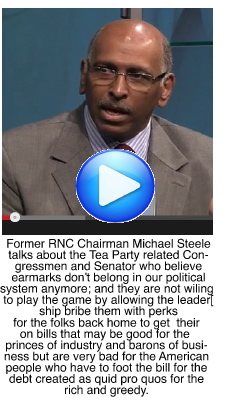 Bill Clinton used the line item veto 86 times before the US Supreme Court ruled it was unconstitutional in 1998, stating that "law-tailoring"
was a form of "legislating." The high court ruled that the Constitution did not provide the Chief Executive with the right to micro-edit bills enacted by Congress. He had to "take it all or leave it."
Bill Clinton used the line item veto 86 times before the US Supreme Court ruled it was unconstitutional in 1998, stating that "law-tailoring"
was a form of "legislating." The high court ruled that the Constitution did not provide the Chief Executive with the right to micro-edit bills enacted by Congress. He had to "take it all or leave it."
The problem with the Line Item Veto was the built-in "ideological political bias" factor that would allow a sitting president to punish the opposition by vetoing their earmarks if those opposing members of Congress who refuse to give the occupant of the Oval Office everything he wanted,or deleting any appropriations for job growth in States controlled by the opposing party. While the high court ruled it unconstitutional under the Presentment Clause (Article I, Section 7, paragraphs 2 and 3—part of the "Origination Clause) they could also have used the Uniformity Clause in Article I, Section 8 (the Taxing and Spending Clause) which states that "...all Duties, Imposts and Excises shall be uniform throughout the United States."
It wasn't that the Justices favor pork barrel spending, or that they were indifferent to the political quid pro quos which should not only never be allowed by anyone to anyone, but should be criminalized, placing in prison for a long time not only the donor and recipient, but the middleman as well.
On Feb. 17, 2010 Taxpayers For Common Sense published the report containing skeletal statistics on the Obama Administration's 2009 and 2010 Appropriations Bills. The 2009 budget was the only budget enacted by Barack Obama and the Democratic-controlled House and Senate. It included 10,363 earmarks.The 2010 budget had 950 fewer emarks. The 2010 appropriations bill—contained only 9,413 earmarks but $300 million more than in 2009. By the way, that's real money which your children, grandchildren and great grandchildren will have to repay the Fed for the quid pro quos given to greedy special interest groups for the money they gave to keep Congress in the hands of the Democrats.
If you remember, in 2009 when America learned that Congressmen and Senators rewarded their wealthiest corporate donors to the tune of $15.6 billion, Obama appeared outraged and announced he was going to launch an investigation. What the "investigation" Obama never launched revealed is that US Senator Barack Obama inserted one major billion dollar quid pro quo in the 2009 budget to a Mattoon, Illinois company called FutureGen Alliance (which was comprised of nine coal processing companies, including Ameren Energy Resources, Babcock & Wilcox and Air Liquid Process & Construction, Inc.) to build a clean coal repowering program FutureGen 2.0), which may be the reason why Obama embarked on his kill coal vendetta. It appears from this that he wasn't trying to kill coal, he was simply trying to surrender the processing of coal from the traditional coal industry to the FutureGen Alliance.
How does the occupant of the Oval Office conceal a billion dollar sweetheart deal with a wannabe green energy coal producer campaign consortium donor? Hypothetically he inserts the quid pro quo as an earmark in the 2009 Appropriations Bill in the fall of 2008 after he wins the election. Interesting, that earmark was the single largest earmark in United States history.
RedState noted in a May10, 2014 article that the Dept. of Energy projected that FutureGen would employ approximately 1,900 new jobs would result from Obama's billion dollar earmark. Doing the math, this works out $526,315.79 per job. The billion dollars was spent in a five word earmark: "...fossil energy research and development."
When Obama was elected to the US Senate he freely chased earmarks. In his last two years in the Senate his view on earmarks appeared to change, and he became opposed to them, pushing for transparency laws which would force lawmakers to post the detail of proposed earmarks on a special government website that would make it easy for media to know who was placing earmarks in legislation and precisely what the earmark entailed. In 2007 Congress put into place a rule obligating lawmakers to post prospective earmarks every spring. Yet, a year later, Sen. Obama—who was now publicly opposed to earmarks—created the largest earmark in history. And, it was just as transparent as the entire Obama history was from Obama's State Senate days when his past was artfully erased and recrafted.
When Harry Reid was asked by Roll Call his view on earmarks on May 6, 2014, the Senate Majority Leader replied that he has been "...a fan of earmarks since he got here the first day. Keep in mind, that's what the country has done for 200 years except for the brief period of time recently." Reid's statement, of course, was not exactly correct. He was right that the first softmarks were as old as the nation. It came with the passage of The Lighthouse Act of 1789 which federalized state-owned lighthouses.
To get the votes to enact the law, the bills Federalist sponsors agreed to pay for a new lighthouse at Cape Henry, Virginia. In addition, Congress included earmarks to build piers on coastal cities along the mid-Atlantic coastline. The leadership in both Houses, use earmarks the same way today. They are bribes to entice a Congressman or Senator vote for a piece of legislation they know is bad for the nation but good for money barons who actually steer the course of rthe engine of state. Earmarks are the lubricant that sweetens a sour bills the leadership needs to pass. Earmarks were used sparingly until the Clintons came to Washington. By the time Obama took office they had spiraled out of control, from 200 or so per year in 1993 to over 10,000 in 2009. Everyone used them for every imaginable reason. Why not? It was free money. It didn't cost the lawmaker giving it away a penny. But your children's children will be paying that debt back over the next ten lifetimes. And the Fed bankers who created that money out of piles of debt, will grow a hundred times richer because of it.
Earmarks were born in 1789, but they were not commonly used. And never used to compensate a wealthy donor for contributing to a Congressman's campaign war chest since only the gentry ran for office, and those campaigning for a seat in the House stumped for votes. And, since the two Senators for each State were picked by the State legislatures, the favored candidates for the Senate would either be a friend of the State governor or the head of the State assembly or Senate. Add to that the fact that being a Congressman or Senator was a part-time job. The only time the politicians went to Washington-town was when Congress was in session.
The first earmark to become a public outrage happened in the winter of 1829 when a block of row-houses in Georgetown caught fire and burned down during a cold winter storm. Congress passed a joint resolution to provide $20,000 to rebuild the row houses—an act of charity, or so they thought. 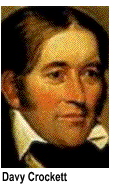 The public didn't. Several Congressmen, including second term Congressman Davy Crockett, were booted from office.. Running for re-election in 1830, Crockett found very little support in his Tennessee congressional district for those who waste the taxpayers' money. He was overwhelmingly defeated. One backwoods farmer, Horatio Bunce told Crockett that Congress had no authority to give his taxes to private citizens, adding that, "...when Congress stretches its power beyond the limits of the Constitution, there is no limit to it—and no security for the people."
The public didn't. Several Congressmen, including second term Congressman Davy Crockett, were booted from office.. Running for re-election in 1830, Crockett found very little support in his Tennessee congressional district for those who waste the taxpayers' money. He was overwhelmingly defeated. One backwoods farmer, Horatio Bunce told Crockett that Congress had no authority to give his taxes to private citizens, adding that, "...when Congress stretches its power beyond the limits of the Constitution, there is no limit to it—and no security for the people."
Reelected on a promise of financial austerity in 1832, Crockett made a speech on the floor of Congress 0n March 6, 1835 arguing against the use of public money to make a grant to the widow of distinguished naval officer. He said: "I will not go into the argument to prove that Congress has not the power to appropriate this money for an act of charity. Each member on this floor knows it. We have the right as individuals, to give away as much of our own money as we please in charity; but as members of Congress we have no right to appropriate a dollar of the public money."
The use of earmarks for political graft first happened when fur-trader John Jacob Astor who built a fur-trading empire from the St. Lawrence River to the Great Lakes. 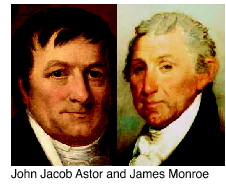 Astor formed the American Fur Company in the United States to compete with the Hudson Bay Company in Canada. He bribed scores of politicians to get legislation enacted to protect the American Fur Company, and its network of trading posts across the northern United States, and eventually, all the way to the Pacific Ocean. In Canada, detachments of the Northwest Mounted Police were stationed at the trading posts, and in the United States, Astor's assets were protected by the US Army. Among those he bribed was President James Monroe who received a $5,000 "loan" from Astor with no repayment clause. A gentleman's bribe. Astor became America's first multi-millionaire and James Monroe became America's first pauper ex-president. Self-shamed for allowing himself to accept Astor's graft, when he left the White House, Monroe scrimped to repay every penny he accepted from Astor. Monroe died virtually penniless on July 4, 1831.
Astor formed the American Fur Company in the United States to compete with the Hudson Bay Company in Canada. He bribed scores of politicians to get legislation enacted to protect the American Fur Company, and its network of trading posts across the northern United States, and eventually, all the way to the Pacific Ocean. In Canada, detachments of the Northwest Mounted Police were stationed at the trading posts, and in the United States, Astor's assets were protected by the US Army. Among those he bribed was President James Monroe who received a $5,000 "loan" from Astor with no repayment clause. A gentleman's bribe. Astor became America's first multi-millionaire and James Monroe became America's first pauper ex-president. Self-shamed for allowing himself to accept Astor's graft, when he left the White House, Monroe scrimped to repay every penny he accepted from Astor. Monroe died virtually penniless on July 4, 1831.
Earmarks lost their luster in Washington-town until the Credit-Mobilier/Union Pacific scandal which began during the presidency of Abraham Lincoln in 1864 with congressional charter which created the Union Pacific railroad. The scandal began to simmer in 1868 when Congressman Oakes Ames (the politician behind the curtain), Thomas Durant and George Francis Train created Credit Mobilier of America as the shell company that would borrow the money and pay Union Pacific to build the transcontinental railroad. (Durant was fired for bad management in 1867. 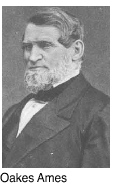 Congress replaced him with Congressman Ames.) Congress had loaned Union Pacific $94.650,000 and Credit Mobilier $50,721,000. The loan generated a total of $43,930,000 in profits (although Credit-Mobilier only reported income of $23,366,319. All of the quid pro quos and the taxpayer earmarks to Credit Mobilier were done in secret.
Congress replaced him with Congressman Ames.) Congress had loaned Union Pacific $94.650,000 and Credit Mobilier $50,721,000. The loan generated a total of $43,930,000 in profits (although Credit-Mobilier only reported income of $23,366,319. All of the quid pro quos and the taxpayer earmarks to Credit Mobilier were done in secret.
In addition to the original $100 billion the taxpayers loaned to Union Pacific through Credit-Mobilier of America, Congress granted Union Pacific additional loans and bonuses of $16,000 to $18,000 per mile as the steel tracks slowly crept across the nation. The debt was owned by Union-Pacific, but the money went directly to Credit-Mobilier which paid its shareholders handsome dividends for keeping the money spigot turned on. Credit Mobilier used the checks they received to keep the railroad inching forward while they used the checks they received to buy additional shares of Union Pacific stock and bond issues. 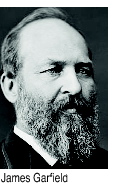 These were sold on the open market for huge profits. The scandal came to a boil in 1872 when the Union Pacific Railroad was unable to pay its debts. The House of cards collapsed and a Dept. of Justice investigation involving 13 US Senators and Representatives commenced . Several members of Congress were censured.
These were sold on the open market for huge profits. The scandal came to a boil in 1872 when the Union Pacific Railroad was unable to pay its debts. The House of cards collapsed and a Dept. of Justice investigation involving 13 US Senators and Representatives commenced . Several members of Congress were censured. 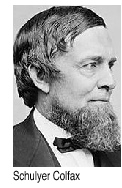 One was Congressman James A. Garfield who was able to rid himself of the stench of the scandal and become President in 1880. Another was Ulysses S. Grant's vice president, Schulyer Colfax who was forced to resign to avoid impeachment and the threat of prison.
One was Congressman James A. Garfield who was able to rid himself of the stench of the scandal and become President in 1880. Another was Ulysses S. Grant's vice president, Schulyer Colfax who was forced to resign to avoid impeachment and the threat of prison.
Perhaps Sen. Harry Reid was more right about earmarks than I thought before I more deeply pondered the evolution of modern day earmarks. I guess the Senator was right when he said "...that's what the country has done for more than 200 years except for that brief period of time in recent years...This is something that's been going on for centuries in our country and its worked quite well." The fact that grifters like Sen. Reid are still in office and still have their hands in our pockets is a mute testimony to just how well it's working.
Before I close, let me tell you, very briefly, how they do it. Reid suggested in his conversation with Sen. Claire McCaskill [D-MO] that to keep earmarks Congress might have to be more transparent. As Reid knows, that would actually be quite easy. All the Congressmen and Senators would have to do is enter their earmark riders into the appropriation bill they are attaching it to when the appropriations bill is first introduced, before the appropriations bill is read on the floor of each chamber. Of course they don't really read the whole bill. They read the name of the bill, the bill number and a description of the bill. And, if there are any amendments [such as earmarks], they read the sponsor's name, the amendment number and a brief description of the amendment, and of course, the time and date of the floor reading. It is after the floor reading that the transparent Congressmen and Senators add the earmarks they don't want the voters back home to know about.
When the lawmaker puts together his earmark, the bill number he or she enrolls it under is not a new number. They find a bill from that chamber which was previously enrolled (before the date of the floor reading of the appropriations bill), but was either defeated of never voted on. The earmark, which will bear an enrollment date earlier than the floor reading of the bill its being attached to, is then made a part of the money bill. Unless someone takes the time to read what will likely be a 2,000 page bill, the media will likely never do the legwork to tie the earmark to a major donor or a special interest lobbyist. And, even if they do, the voters in that State or congressional district will smell jobs coming to their State, couldn't care less. It just never seems to dawn on them that they're the one—them and their children, their grandchildren and their great-great-grandchildren will spend their whole working life paying back an earmark some long-dead lawmaker back in, say, 1967 gave away as a quid pro quo to a special interest donor for a few thousand bucks that helped that politico get re-elected way back when, or maybe build a factory somewhere that never opens or closes a year or two later when the grand green gratuity runs out..
In the final analysis politicians like Harry Reid like earmarks for one reason and one reason only: earmarks get them reelected and, to a politician, there's just nothing more important than that. Oh, by the way—Obamacare became the law of the land because of an earmark. You see, every piece of legislation that is tied to the Affordable Care Act, originated in the US Senate. Obamacare violates the Origination Clause of the Constitution which mandates that all appropriation bills must originate in the House of Representatives. Both pieces of that legislation, the theoretic House version (HR3590) and the Senate version (HR3962) both have Harry Reid's fingerprints all over them because HR3590, the Affordable Care Act was 99% a Senate creation. The 1% that was created in the House? The Bill number, HR3590 did originate in the House—but it originated as the Service Members Home Mortgage Ownership Act of 2009, enrolled in the House on Sept. 17. 2009.HR3590, the Affordable Care Act was 99% a Senate creation. The 1% that was created in the House? The Bill number, HR3590 did originate in the Houseóbut it originated as the Service Members Home Mortgage Ownership Act of 2009, enrolled in the House on Sept. 17. 2009.
It had nothing to do with heathcare. It provided a tax credit for first time home buyers who were in the military with combat service. Reid knew before the Affordable Care Act became law Congress had to be able to prove the legislation originated in the House, not the Senate (the House numbers on all of the bills, nothwithstanding). Reid dug up Charlie Rangel's dead Service Members tax credit bill, gutted all of the content of the bill (except the first line which appeared in the Congressional Record, and replaced the 714 words in that bill with the 379,976 words in the Affordable Care Act—plus approximately $680 million in new taxes which Reid could not do. (That makes Mr. Earmarks prime for impeachment.)
Yes, it's no wonder Harry Reid has loved emarks since his first day in Congress. You can literally do the impossible with an earmark—even sidestep the Constitution of the United States. The question is, Mr. and Mrs. America, what are YOU—"We The People"—going to do about it when your politicians openly commit constitutional fraud and laugh in your face because tghey are convinced you're too stupid to do anything about it.

Copyright © 2009 Jon Christian Ryter.
All rights reserved.


